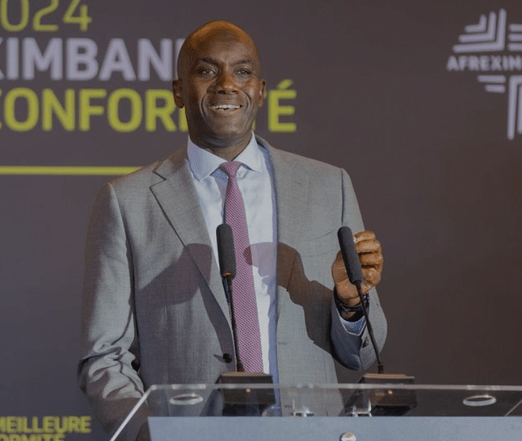By Bernard Yaw ASHIADEY & Ebenezer Chike Adjei NJOKU
Trade goes hand in hand with compliance. A very compliant system boosts trade opportunities for businesses and economies and so it is no surprise that Africa’s premier trade bank and trade facilitator, African Export-Import Bank (Afreximbank) organises the annual Afreximbank Compliance Forum to discuss the latest issues with regards to compliance to facilitate the ease of trade on the continent.
In an exclusive interview with the Business Financial Times (B&FT), Idrissa Diop, Compliance Director at Afreximbank, a high-ranking official shed light on the critical intersection of compliance, artificial intelligence, and intra-African trade. This conversation took place on the sidelines of the 2024 edition of the forum on the theme ‘Better Compliance, Better Trade’.
He offers unique insights into the challenges and opportunities facing African financial institutions in an era of increasing regulatory scrutiny and technological advancement. The discussion covers a wide range of topics, from the application of artificial intelligence in compliance processes to the complexities of navigating international financial watchlists.
Of particular interest is the bank’s perspective on adapting global compliance standards to the African context, a theme that recurs throughout the conversation. He emphasizes the need for “tropicalization” of technologies and practices, highlighting the importance of tailored solutions for the continent’s diverse economies.
The conversation also delves into the implications of compliance for the African Continental Free Trade Area (AfCFTA), offering a nuanced view of how regulatory alignment could accelerate economic integration across the continent.
Perhaps most notably, the interview provides a preview of a significant development in African financial compliance: the imminent announcement of a new pan-African compliance body. This initiative promises to bridge the gap between regulators and businesses, potentially reshaping the compliance landscape across the continent.
Below, readers gain valuable insights into the strategic thinking at one of Africa’s premier financial institutions, as it grapples with the dual challenges of fostering trade and ensuring robust compliance in a rapidly evolving global financial ecosystem. Mr. Diop shall be referred to as (ID) and the Business and Financial Times shall be referred to as B&FT.
B&FT: Can you give me a bit of a summary of what you discussed?
ID: Actually, I am going to be even broader than that. We discussed how banks, financial institutions, and regulators can benefit from artificial intelligence to have better control of money laundering risk and ensure better compliance in the industry.
We also discussed the impact of sanctions and how banks and the financial sector have to put measures to comply with those sanction measures and avoid their platforms being leveraged by sanctioned individuals hiding under structures to conduct illegal business.
Since we started this conference, we have been discussing how the concept of compliance can be leveraged to improve business platforms. Ultimately, when you improve your business platform, you are able to better sell and interact with both internal stakeholders in the country and those outside. That’s why the slogan of this conference is ‘Better Compliance, Better Trade’.
B&FT: On the subject of artificial intelligence, which has become a buzz terminology for the past two or three years, how are we going to be able to leverage that on this side of the world to do better compliance and then better trade?
ID: I believe that it is good that we are have invited technology companies to this forum show the latest technology in terms of anti-money laundering fight and risk monitoring. We understand that you cannot control and monitor risk with your two hands. You need to leverage technology.
However, maybe the technology launched somewhere in Europe or America is not good for us because we need to tropicalize it and make it adaptable to our environment, our regulation, and the way business flows from point A to point B. Something quite trivial in banking in the US can be very complicated if you want to replicate it as such in a different environment.
Our banks must make efforts to have good quality information to feed the artificial intelligence with data that can process and produce results reflecting our situation. We don’t want to just buy technology from outside, deploy it, and expect it to work or give relevant results.
Even when you buy a car from Japan and bring it to Africa, you need to adapt some features because of the heat and other factors. We need to adapt artificial intelligence to the reality of how we do banking and business in Africa.
B&FT: There are quite a number of African or West African countries on the grey list, and unfortunately, some have been on the list for quite some time. Luckily for Ghana, we exited. But the biggest economy, Nigeria, is still there. South Africa is still there. What is happening for the two biggest economies to be on this list?
ID: Let me answer this differently. What is making our countries be on the grey list? It is not only Africa. You have some countries from Latin America and other parts of the world. From inception, our economies were not properly framed to protect themselves against the risk of money laundering, tax evasion, etc., which make the economy weak and subject to risks that, from a best practice point of view, put them on the grey list. These are weaknesses in our economies from a framework and regulation point of view.
For example, when you have a country where a casino can open everywhere, and you know casino is a place where gambling and a lot of money is going through, when we put you on the grey list, we want to force you to improve your regulation. The way you monitor the banks, the notaries, the gambling places, etc.
People are now working on those regulations and getting Parliament to vote on them because the tone has to come from the top. Even after Parliament votes, the operational implementation can be problematic.
That’s why you have entities like The Inter-Governmental Action Group against Money Laundering in West Africa (GIABA), who patrol our countries and look at how those countries are implementing updated regulations or best practices.
B&FT: What is Afreximbank doing, behind the scenes or on the forefront, to help all these economies exit this grey list?
ID: Afreximbank cannot make a country be out of the grey list; that’s not our purpose. We are owned by our African states, and we are here to finance the economy of our African states and help them get to the next level. But we are conscious that compliance is key, it is the point of entrance of any business. So, we are organizing this kind of forum to sensitize people about the need for good regulation and good practices.
That is our modest or humble participation in educating our financial institution community on adopting best practices in terms of compliance. Compliance is quite broad – it’s what your central bank is asking you to do, what your tax authority is asking you to do, and whatever other regulations you have to comply with.
B&FT: Does it mean without proper adequate compliance, the AfCFTA agenda might not be realized in its fullness?
ID: Compliance will certainly help the AfCFTA to be more swiftly implemented. By creating platforms where it is discussed, by sharing knowledge, by every bank adapting the process, we are pushing the car to move. Compliance will help to better make it happen.
B&FT: The feeling or conclusion I am extracting from speaking with other compliance executives is that they believe there is a need for more of an implementing body made up of compliance officials. What do you make of this?
ID: Absolutely. That is we announced the creation of an African Compliance Association. GIABA is, I could say, a policy-led and driven institution that comes to observe and make draft reports about how best practices are implemented. But once best practices are implemented from a policy framework point of view, you need to take it and implement it within the businesses.
If we create a platform where we are acquiring knowledge and packaging it in such a form that we are disseminating it throughout the continent, then someone seated in Ghana will know what is happening in Burundi and vice versa. This platform will be an educational platform. We want to position it such that we are talking with regulators to capture what they want, make it digestible for the common African, and then send it down for the banks and the compliance industry to disseminate it.
What we don’t have today is that bridge between what the regulators want and what the businesses wants. By creating that bridge, we are going to close the current void we have. And then it’s an effort to participate in the AfCFTA dream.
B&FT: Your last words?
ID: Better compliance, better trade.
The Afreximbank Compliance Forum
The Afreximbank Compliance Forum, which was organised in partnership with the Inter-Governmental Action Group against Money Laundering in West Africa (GIABA) was sponsored by some banks including Vista Bank, GCB Bank, Wave, Rawbank, SUNU Group and compliance system providers such as Lexus Nexis, Elucidate, Finanstra and Llyod’s List Intelligence, Consortix, and Vneuron.
The Forum focused on the Financial Action Task Force’s (FATF) requirements for identifying Ultimate Beneficial Owners (UBOs) and their far-reaching implications for trade facilitation.
The FATF, an intergovernmental organisation, sets international standards to prevent money laundering, terrorist financing, and other threats to the integrity of the global financial system. One of its critical mandates is to identify and verify UBOs to ensure transparency and accountability in financial transactions.
Additionally, the Forum explored the transformative role of Artificial Intelligence (AI) in compliance processes, address strategies for African countries to make the necessary reforms to be removed from the FATF’s grey list and showcase the latest compliance technologies.
>>>the coverage of the forum in Dakar, Senegal was made possible by the kind courtesy of Ecobank Ghana, Fidelity Bank Ghana, Stanbic Bank and OmniBSIC Bank Ghana. We at the B&FT appreciate their support. Thank you










